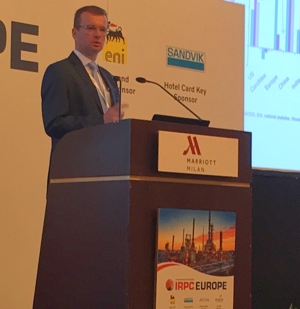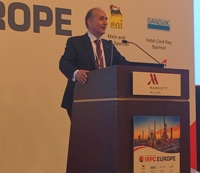IRPC Europe: How long can European refiners see the good times last?
Hydrocarbon Processing’s International Refining and Petrochemical Conference (IRPC) Europe opened in Milan, Italy with welcome remarks from Giacomo Rispoli, Eni’s Executive Vice President Portfolio Management. Eni, Italy’s integrated energy company, is IRPC Europe’s main and host sponsor.
Following opening remarks, Alan Gelder, Vice President of Refining, Chemicals and Oil Markets, EMEARC, for Wood Mackenzie, provided an in-depth look at the current state of Europe’s refineries and if the tide of healthy refining margins are sustainable. According to Mr. Gelder, Europe’s refining margins are likely to remain healthy in 2018 and 2019.
Forecasts show that European refining margins should stay above the five-year average, but below 2017 levels when Hurricane Harvey shut millions of barrels per day of operating capacity along the US Gulf Coast. The ensuing outage increased refining margins for European refiners as they raced to produce additional products to fill the gap in down capacity.
However, as European demand for transportation fuels continues to decline, European producers will need to find an outlet for their products. This may a difficult task since China and the Middle East are increasing refining capacity at a substantial rate. “China, the Middle East and developing economies in Asia,” said Mr. Gelder “will be responsible for building more than 70% of the new grassroots capacity additions by 2023.”
Moving in the early 2020s, global refining capacity is forecast to eclipse demand. In turn, utilization rates are expected to fall and European refineries, especially simple configured ones, will need to compete to survive. “The fear that we have for Europe,” explained Mr. Gelder “is that Europe returns to a period of low utilization and weak margins.” Large, deep-conversion petrochemical integrated refineries will continue to stay cash positive, but simple refineries may be cannibalized. Mr. Gelder explained that one option to combat the forecast for declining gasoline demand in Europe would be for producers to pursue more petrochemicals production.
Hydrocarbon Processing’s IRPC Europe continues through Thursday in Milan, Italy.








Comments